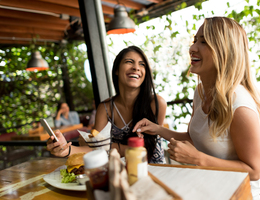
Perhaps you've wondered: Is dining out still an option for me now that I've been diagnosed with kidney disease?
The answer, according to the National Kidney Foundation (NKF), is yes—as long as you order carefully.
Limiting protein, sodium and potassium is key to protecting your kidney health when eating out, just as when you're eating at home.
While it may seem like you have less control over what's on your plate at a restaurant than at home, you can take steps to make sure the food you eat at a restaurant is healthy.
The basics
Keep these three tips in mind when you get ready to go out to eat:
1. Choose your restaurant wisely. Selecting a restaurant with a variety of menu options is likely to make it easier to find something healthful. It's good to call ahead to ask questions about the menu or the restaurant's ability to accommodate special requests.
2. Make special requests. Simply asking for condiments and tomatoes to be left off your burger, salad dressing to be served on the side or fresh green beans to be substituted for a baked potato could open up your dining options and make a meal out possible.
3. Watch portions. In addition to being selective in what you order, you'll also need to pay careful attention to portion sizes, because you may be served more food in a restaurant than you'd eat at home.
To keep from overdoing things, consider:
- Ordering à la carte.
- Requesting half-size portions.
- Splitting an order with another person.
- Taking a portion of what you're served home and eating it for another meal.
Mastering the menu
You should already have a good understanding of what foods are and are not recommended on your diet. But here, courtesy of the NKF, is some guidance for specific meal choices you may be likely to find on restaurant menus.
Breakfast
Choose: Eggs cooked to order; omelets with low-potassium vegetables; toast or bagels with margarine or jelly; low-potassium fruit or fruit juices; pancakes; French toast with imitation syrup; doughnuts, Danish pastry or sweet rolls.
Avoid: Cured or salted meats and omelets made with those meats or cheese, fast-food breakfast sandwiches, hash browns, gravy, high-potassium fruits and juices, whole grain cereals and muffins.
Appetizers
Choose: Canned fruit cups and fresh, low-potassium vegetables.
Avoid: Soups, vegetable juices, potato skins, salted chips and crackers.
Salads/Salad Bars
Choose: Lettuce, alfalfa sprouts, beets, carrots, cauliflower, celery, cucumbers, green peas, green peppers, onions, radishes; coleslaw, macaroni salad or gelatin salad; and canned peaches or pears and fresh or canned pineapple.
Avoid: Raw spinach, olives, pickles, tomatoes, broccoli, mushrooms, kidney beans, chickpeas, bacon bits, seeds and nuts, croutons, potato salad, fresh fruit salad, dried fruit, kiwi, melons, bananas, and oranges.
Entrees
Choose: Broiled or grilled meats, chicken, fish (seasoned with fresh lemon), inner cut of prime rib or roast, and sandwiches with meat filling.
Avoid: Casseroles and mixed dishes, sauces, gravies, heavily breaded or battered items, and cured or salted meats.
Side dishes
Choose: Plain rice; noodles; and lower-potassium vegetables, such as green beans, corn, cabbage, asparagus, green peas, eggplant, carrots, cauliflower or squash.
Avoid: Higher-potassium vegetables, such as spinach, potatoes, tomatoes and mushrooms; winter squash; baked beans, sauerkraut; and vegetables in sauces.
Desserts
Choose: Canned or allowed fresh fruit, sherbet, sorbet, plain cookies, plain cakes, fruit pies with allowed fruits, gelatin, and strawberry shortcake. (Keep in mind that desserts such as sherbet and gelatin must be counted as fluids.)
Avoid: Desserts containing chocolate, nuts, coconut or dried fruit; cheesecake; custard and puddings; high-potassium fruits; cream, mincemeat, pumpkin, rhubarb and pecan pies; and ice cream.
You're not alone
Remember, you don't have to guess if you have questions about good food choices. Your dietitian can be a valuable source of information about eating out or any other aspect of your diet.
Reviewed 10/24/2023